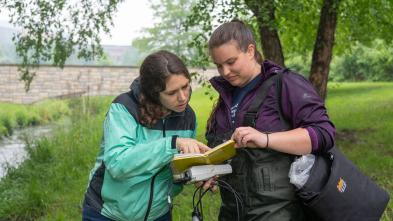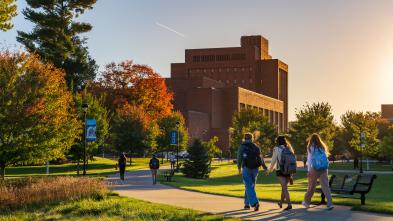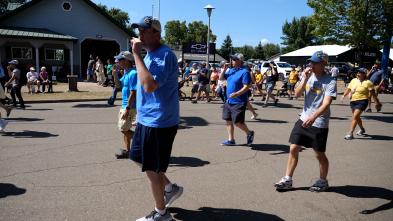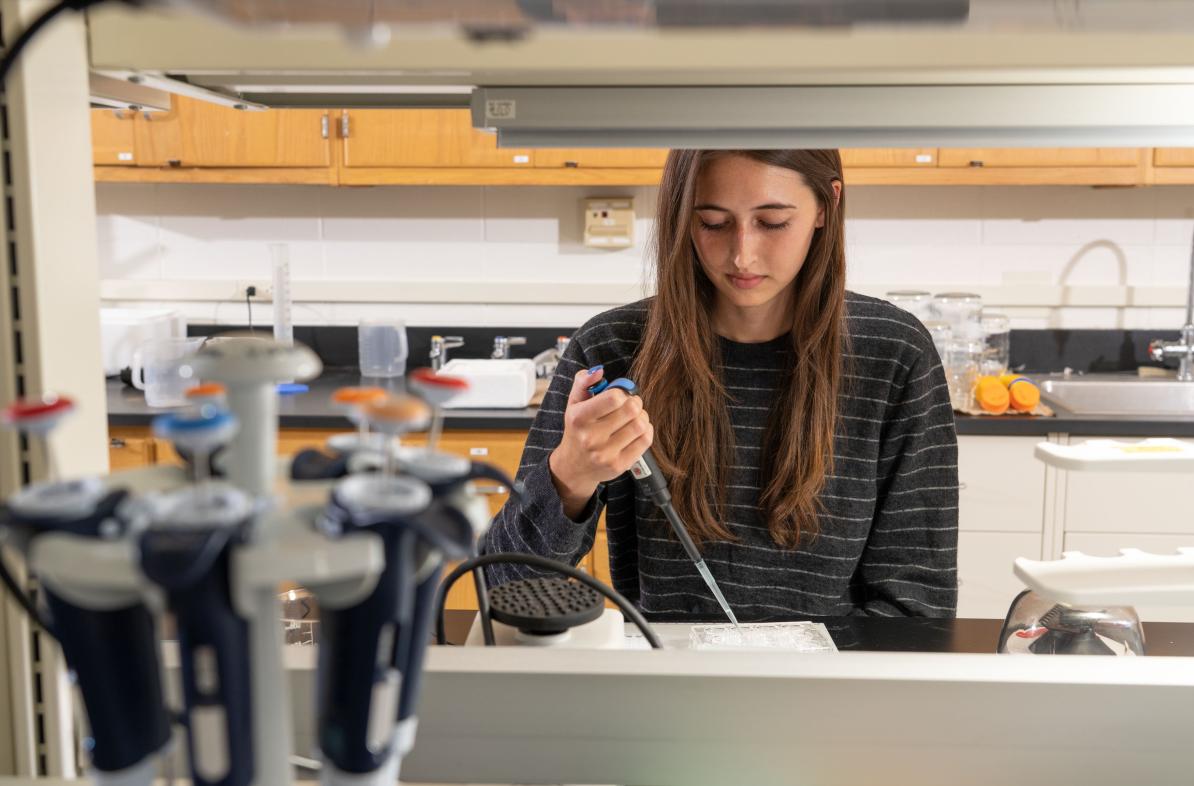
Mayo Clinic neuroscience research internship program accepting applications
Next summer may seem far away, but for University of Wisconsin-Eau Claire students interested in neuroscience, biomedical research and a serious boost to their academic careers, the time to plan for summer 2026 is now.
In yet another research collaboration between UW-Eau Claire and Mayo Clinic, Blugold students have exclusive access to a ten-week summer research internship in Rochester, Minnesota.
The UWEC-Mayo Clinic Regenerative Neuroscience Scholars (ReNS) program, now accepting applications for their 2026 cohort through Oct. 20, gives UW-Eau Claire undergraduates high-quality training in regenerative neuroscience research while being mentored by Mayo neuroscience faculty researchers.
With funding from the National Institutes of Health, ReNS summer internships prepare students for success in careers in research and Ph.D. training in neuroscience and regenerative sciences. This unique opportunity is co-led by Dr. Bradley Carter, associate professor of biology at UW-Eau Claire and Dr. Isobel Scarisbrick, professor of physical medicine and rehabilitation at Mayo Clinic in Rochester, Minnesota.
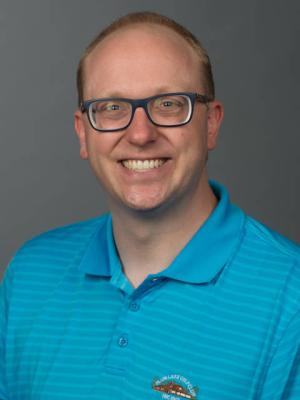
A student experience beyond comparison
While the idea of diving into intensive neuroscience research for a whole summer may sound daunting, students from the first two ReNS cohorts emphasize that learning is the goal, from the ground up in certain cases. One of those students is 2024 cohort member Rachel Stein, a senior biochemistry and molecular biology major from West Salem.
“I felt prepared but also completely like a baby scientist,” says Stein. “I knew the fundamentals and the science behind the project, but learning the lab techniques was new. The summer accelerated my research skills tremendously — I would not trade the experience for the world.”
For Carter, the program is intended to help students explore their interests with supportive mentorship in a world-class research environment.
“A summer research program is a dense learning experience for students, one that can often inform and potentially change career plans as students learn about the variety of research-related career opportunities available,” Carter says. “Students who are curious and enthusiastic about neuroscience and want to invest their time and talents into research are ready for this opportunity.”
From the Mayo perspective, Scarisbrick knows the impact of Mayo Clinic research, and introducing more undergraduates to this level of neuroscience expertise is gratifying and exciting.
“The exposure to Mayo’s clinician-researchers is incredibly powerful,” Scarisbrick says. “Students see firsthand how neuroscience research translates into real patient impact, and that connection makes the work feel urgent and meaningful. It’s often the first time they can clearly see themselves as future scientists — not just learning about the brain but contributing to how we understand and heal it.”
“The students far exceeded our expectations,” Scarisbrick adds. “Our main goal was to expose students to the rigor and nuance of neuroscience research — not just observing but actively doing. They've risen to the challenge, and the growth in their technical skill, scientific thinking and independence has been impressive.”
Dr. David Jewett, professor of psychology and neuroscience instructor at UW-Eau Claire, can attest to the growth that students make during the ReNS program — positive changes in skills, confidence and identity as scientists.
“The UWEC scholars have a unique opportunity to focus exclusively on research for 10 weeks with no other courses or jobs competing for their time,” Jewett says. “This allows them to gain firsthand experience about the expectations, successes and challenges related to a career that involves research.”
Two of the 2025 ReNS interns are now conducting research in Jewett’s lab, and to him the differences he sees in them as student researchers are impressive.
“These students returned to my laboratory after the experience better able to handle the conceptual and day-to-day challenges of the laboratory and more experienced in higher-level scientific communication skills such as data analysis and presentation.”
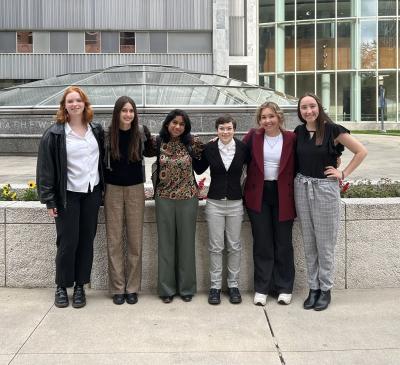
What does a ReNS internship entail?
There are three core experiences of the ReNS program for Bluoglds. They are:
- Training in a two-credit spring semester seminar class, BIOL386 seminar, with Carter and other UW-Eau Claire students as an introduction to science as a profession and preparation for summer research.
- Paid full-time summer research positions in the Mayo Clinic Summer Undergraduate Research Fellowship (SURF) program in Rochester, Minnesota, with support from Mayo faculty mentors and with near-peer mentoring with Mayo Clinic graduate students.
- Presenting summer research in the subsequent fall semester at a regional undergraduate neuroscience conference (Midbrains) and an undergraduate-focused national conference (Annual Biomedical Research Conference for Minoritized Scientists, ABRCMS) and in the subsequent spring semester on campus at UW-Eau Claire's annual Celebration of Excellence in Research and Creative Activity (CERCA). Conference expenses are covered by the program.
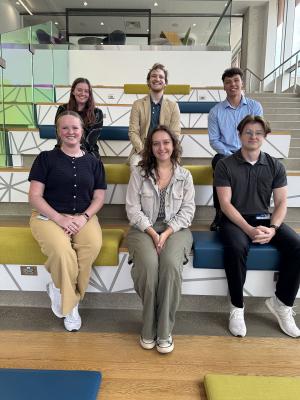
Hear from more past ReNS interns
We asked several interns from 2024 and 2025 to share a few thoughts about the ReNS program, and it’s clear from their responses that the reasons for interested students to apply are compelling.
What sparked your interest in neuroscience and the ReNS program?
Peter Handley, senior psychology major from Golden Valley, Minnesota, 2025 cohort
At a young age I was diagnosed with ADHD and learning disabilities, and I also have struggled with mental health. In order to succeed, I’ve had to be involved in things like therapy or more individual learning, and I naturally had to find out more about the mind to better myself. Funnily enough, it turned out that I really enjoyed learning about all these things from an academic perspective.
I'm interested in becoming a pediatric neuropsychologist, diagnosing kids with developmental disabilities. I had already had lots of experiences with psychological focus and clinical focus, but not so much biological or research based. I thought it would be difficult for me but hoped it would also be rewarding and helpful. I learned so much from this internship and it's going to be something I take with me for the rest of my career.
Did you feel prepared for the work, and how did the summer project accelerate your research skills?
Hannah Nelson, senior psychology major from Madison, 2025 cohort
I did not really feel prepared, but I don't think that this is the type of work you can really prepare for. If you have the basic skills and desire to learn more, you can adjust. I felt like I was being thrust into an area I knew nothing about, but I learned so much that can only be learned by doing.
The whole process forced me to better use my resources, and working things out on my own forced me to get used to trial and error and things not working out. Failure also helped me develop skills like time management, taking good notes, communication and resilience.
What have been your greatest takeaways from the ReNS experience?
Makenna Hawkins, senior speech, language and hearing sciences major from Hammond, 2025 cohort
The ReNS experience reinforced for me the advice to take every opportunity given to you! Whether it be academic, career or personal, just take the opportunity because you never know what you might learn about yourself or the world around you. I never would have signed up for ReNS on my own, but I’m glad I was encouraged because if I hadn’t, there are so many things I would have never experienced or even known about. I learned so much, made some important career plan decisions, made some great friends and take with me many fond memories.
Do you have specific career goals in neuroscience or a related field? How do you think your ReNS experience will impact your overall undergraduate degree outcomes?
Gabrielle Orth, senior biomedical engineering major from Rogers, Minnesota, 2024 cohort
I am considering applying for biomedical research Ph.D.s or eventually become part of a research and development team at a medical technology company. Both paths would use the skills that I learned at the ReNS program. I believe that the program opened up pathways for me that many others don't have access to, and for that I am grateful.
The ReNS program made me feel as though I was capable of more than I originally thought. I am only considering a research Ph.D. because of this experience.
Apply now to the UWEC-Mayo Clinic Regenerative Neuroscience Scholars (ReNS) program
- Applications will be accepted through Oct. 20. Visit the ReNS website for application steps, requirements and the link to apply.
- For more information about the program and student experience, see this 2024 story announcing the launch of the ReNS program.
You may also like
